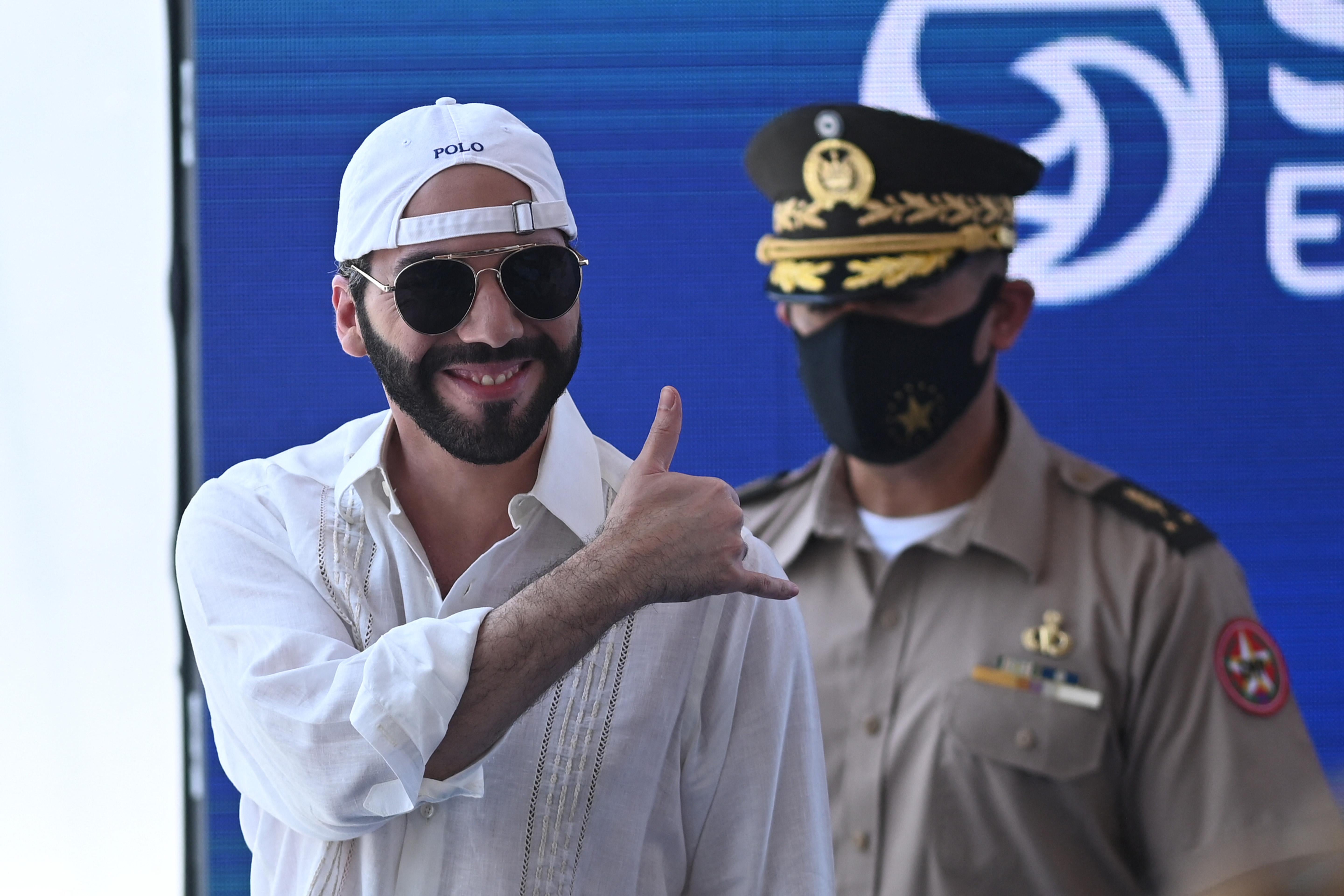Nayib Bukele, the 40-year-old President of El Salvador, is quickly becoming Latin America’s first millennial dictator. On May 1, 2021, Bukele and his supporters in the legislature fired the country’s top prosecutor and highest court—before packing both institutions with loyalists. Since this power grab, Bukele has used state agencies to harass journalists, investigate opposition parties, and undermine government oversight. He and his allies are also drafting a new constitution, expected to be unveiled later this year. Bukele’s mission, as he explained in a recent speech to the legislature, is to ensure that his opponents never return to power.
If public opinion is any indication, he may well succeed: Even as he has undermined Salvadoran democracy’s checks and balances, the president remains overwhelmingly popular. Elected in 2019 with 53 percent of the vote—21 points above his nearest rival—recent polls place Bukele’s approval rating well above 80 percent.
How has Bukele managed to amass so much power—and to remain so popular while doing so? As I argue in a recent piece, Bukele relies on millennial authoritarianism, a distinctive political strategy that combines traditional populist appeals, classic authoritarian behavior, and a youthful and modern personal brand built primarily via social media. These three elements have worked together to give Bukele a formidable political coalition.
Through traditional populist appeals, Bukele has successfully framed himself as an antidote to El Salvador’s corrupt and ineffective political establishment. Bukele describes his movement as a historic effort to retake power from a deeply entrenched political elite, which he calls los mismos de siempre, or “the same ones as always.” His campaign platform, for example, vowed to erase “institutional chieftainships” and return power to the people. And in his inauguration speech, Bukele claimed that, for the first time, Salvadorans would “decide how [they] want to be governed. Because now we will have a government of the people and for the people.” This populist narrative has resonated with many Salvadorans who are tired of a system that has long tolerated corruption, crime, and poverty, and long for a fresh start.
At the same time, Bukele has used authoritarian tactics to signal that his determination extends beyond mere rhetoric. On Feb. 9, 2020, for example, he and a contingent of armed soldiers invaded the legislature in an effort to intimidate lawmakers. In May of this year, Bukele celebrated the removal of the attorney general and Supreme Court judges in real-time: “This is called democracy” he tweeted. “In 200 years, our country had not savored it, but now we do.” In a country where voters do not trust politicians to deliver on their promises, Bukele’s track record of backing up populist rhetoric with authoritarian attacks against the political establishment has quickly broadened his base of support.
But while Bukele talks like a quintessential populist and behaves like a classic autocrat, he differs from the traditional strongman in one critical dimension: He uses social media to project a youthful and polished personal brand. His sleek and stylish look—common staples include leather jackets, backwards baseball caps, slim-fitting jeans, and aviator shades—stands in stark contrast with our conventional image of a stern strongman leader. Bukele is also known for sharing memes and chiming in on sports, video games, and popular culture. More generally, he is a master of using social media to control his personal image, shape the political narrative around him, and communicate directly with voters: Since 2009, he has tweeted to his 2.8 million followers (roughly equivalent to three in every ten Salvadorans) more than 75,000 times, for an average of more than 16 posts per day. He is, in his own words, “the coolest president in the world.”
This modern and social-media-savvy brand compliments Bukele’s populist and authoritarian tactics. For starters, it allowed him to circumvent traditional party-building: While most politicians rely on strong party organizations to reach and mobilize voters, Bukele—who ran for president as the candidate of a small center-right party—has instead been able to reach voters through his well-oiled online operation and rally them around a carefully cultivated personal brand.
In addition, thanks to his fresh brand and his personal connection with his followers, Bukele has been able to mobilize the 70 percent of Salvadorans who, as recently as 2018, said they were not interested in politics. Young voters, who tend to be both less interested in politics and more active on social media, have especially gravitated toward him.
Finally, Bukele’s carefully cultivated image has helped him reassure voters who favor change but fear extremism. Although Salvadorans are generally unhappy with their political system, most identify as centrists. Bukele has mitigated the risk of alienating moderate voters with his authoritarian and populist appeals in part by balancing these forceful tactics with his sleek and polished brand—a far cry from the more brazen style that is often associated with strongmen or political extremists.
Bukele is not the first politician to use populist appeals, engage in authoritarian behavior, or embrace social media. What sets his millennial authoritarianism apart is the integration of all three tactics into a cohesive and effective political strategy.
Could Bukele’s dramatic success serve as a model for other would-be autocrats in the age of social media? There are compelling reasons to think so. Millennial authoritarianism relies on deep public dissatisfaction with the status quo and widespread access to social media. Both conditions are widespread. According to a 2018 survey, for example, only 24.4 percent of Latin Americans are fully or mostly satisfied with their countries’ democracy, while 70.9 percent are active on social media. Through millennial authoritarianism, Bukele has skillfully capitalized on these twin trends to accumulate political power and undermine checks and balances. He is unlikely to be the last.
A full version of this essay appears in the July issue of the Journal of Democracy.
